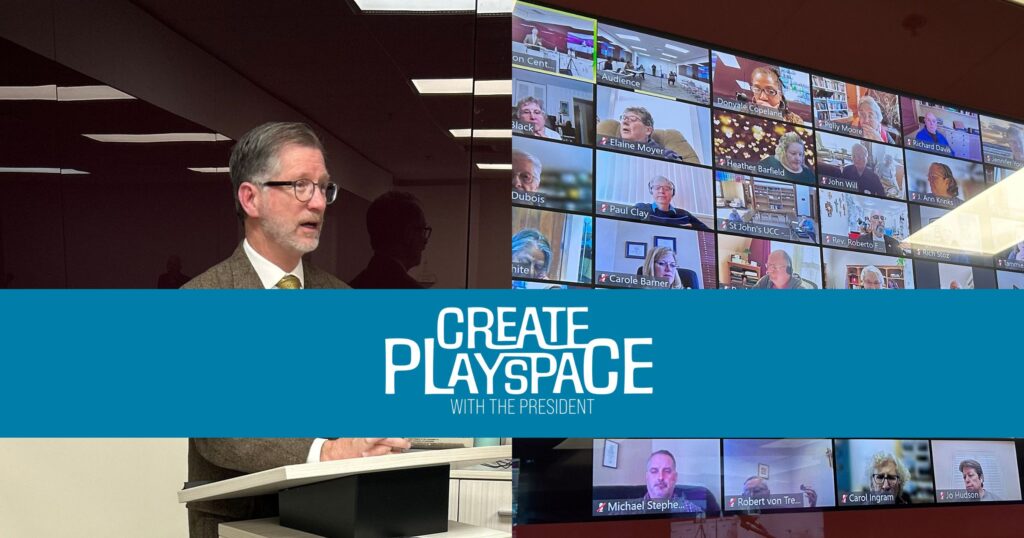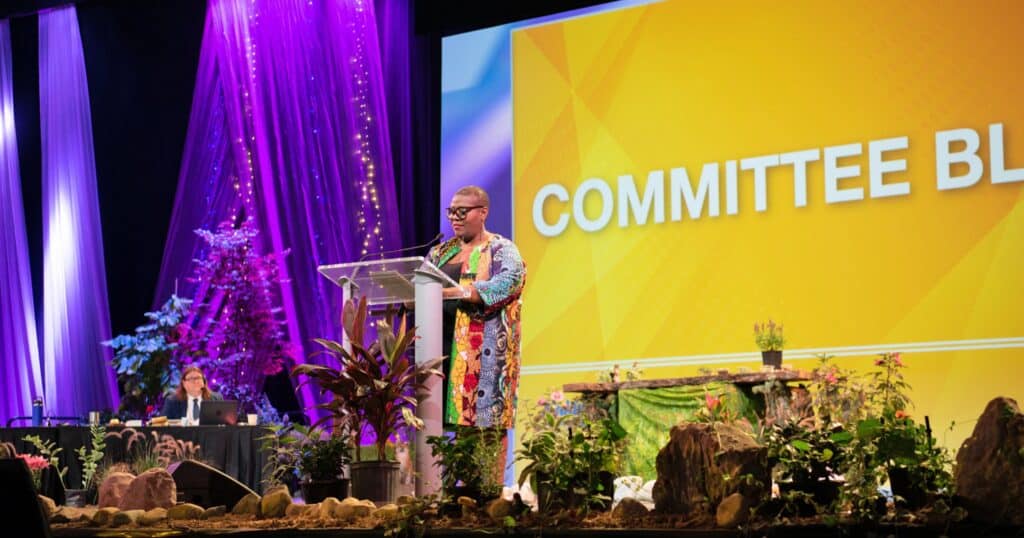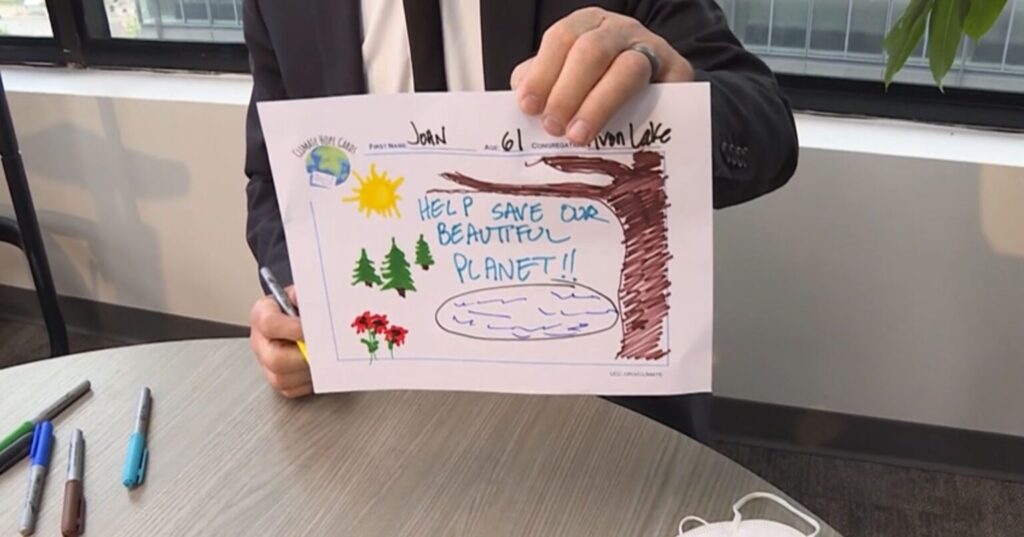‘Openness to new ideas’: GMP holds interactive conversation on ministry and tech
Virtual church members. Accessibility needs. Tech deacons. Hybrid services. Reaching people where they are.
All of these topics and more came up during ‘Create Playspace with the President’ on Wednesday, Feb. 15, the first in a series of virtual events designed to foster a spirit of collaborative play around timely issues facing the wider Church.
The Rev. John Dorhauer, UCC general minister and president, opened the interactive conversation by inviting people to share and engage. “We desire not just your voice, not just your participation, but your creative thinking, openness to new ideas.” He credited James Carse, who wrote the book Finite and Infinite Games, for inspiring the use of play as a way to think about pushing boundaries and making change within institutions.
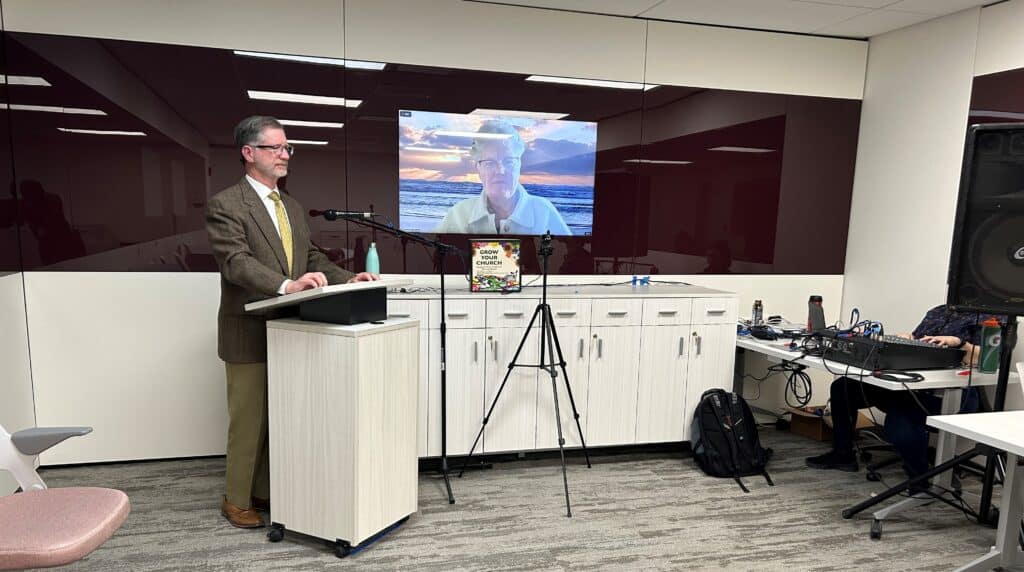
‘Technologically significant’
National staff facilitated the event from the Cleveland office meeting room named Mission Central, and 90 attendees joining on Zoom from around the country were visible on the room’s walls designed for interactive engagement. There were some small technical tweaks as things began – adjusting cameras and the occasional prompting to unmute on Zoom – but Dorhauer acknowledged in his introduction that the best-laid plans require a readiness to adapt.
As the “provocateur” intended to spark conversation, Dorhauer offered a short reflection on his experience as a “digital immigrant,” coming around to use computers after going all the way through seminary without one. He recounted a keynote address at the 2015 General Synod from the Rev. Paul Raushenbush that encouraged the UCC to “get in the game” on the evolving digital revolution at the time. Dorhauer also shared a 2017 Strategic Vision Report which imagined a healthy UCC ten years in the future as “technologically significant.”
Tech innovation, ministry, the future
Those present addressed using tech to meet accessibility needs and how having virtual participation options has helped protect people from regular illnesses like the flu and common cold. One topic stream centered around how to help older congregants less familiar with technology learn how to use it. While some suggested recruiting the youth as instructors, making intergenerational connections, others wondered if the young people might get tired of being expected to teach everyone else.

UCC Chief Strategy Officer and the event’s host, Cheryl Williams, prompted a lively conversation among virtual attendees when she invited people to offer short spoken comments on the benefits and challenges of technology they have experienced in ministry. Others responded simultaneously through the Zoom chat function, all centered around questions of tech innovation, ministry and the future.
Discussion on how to create virtual inclusive faith communities was sparked when participant Debbie Bahr offered her experience as a church member who attends all events online. “What I see is that people who are making decisions and speaking need to incorporate the online attendees as regular members,” she said. “Language is really important … Is it truly one faith community or are [virtual attendees] just another group of people?”
A struggle and a lifeline
Jesse Letourneau, pastor of Salem United Church of Christ in Westphalia, Ind., observed how the conversation “immediately went into the sanctuary,” focused on in-person gatherings. He asked, “What does it mean for technology to be for the people who aren’t here? … How do we use it to reach people who are hurt and alone and aren’t coming to church but are online?”
The lack of internet service in some parts of the country, especially rural areas, is another issue that arose. Amelia Price, pastor of Saint Paul’s Verdilla UCC in Selinsgrove, Pa., shared that her church has no internet or cell service. “How do we not leave these people behind?” she asked. In response, Dorhauer highlighted a resolution for this summer’s General Synod, titled “Closing the Digital Divide”, that focuses on digital justice and inclusion.
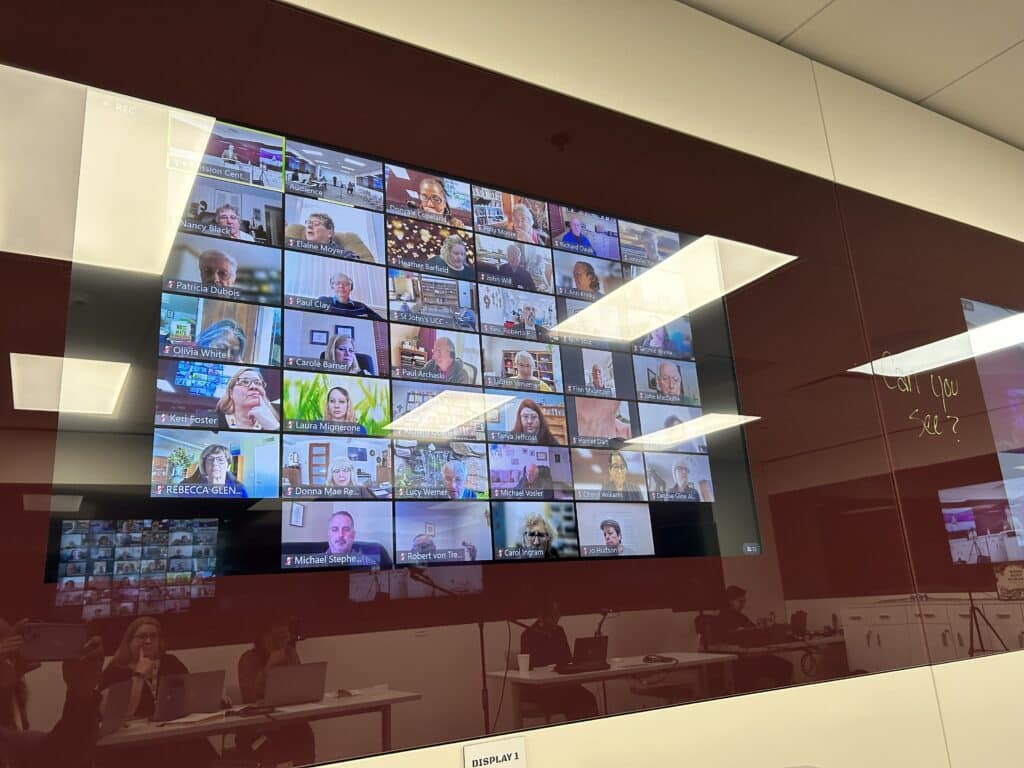
Some used the space to share tech resources and programs they have learned to use to make things run more smoothly, naming programs like Be.Live to run hybrid services, Promptsmart teleprompter software for reading sermons on camera and Giving Tools for collections online.
Using tech to share values
Some brought up opportunities for sharing a progressive Christian identity through technology. “I would like to see how to use tech to let people know who we are and what we stand for, re: justice issues that are so contentious right now,” said Alice Stambaugh of Scottsdale Congregational UCC in Scottsdale, Ariz.
As the hourlong gathering ended, participants expressed the need for more time focused on the use of tech in ministry settings.
“The UCC indeed has a valuable messaging that is needed right now, and it’s obvious a lot of churches still struggle with technology and technology costs. One hour just isn’t enough,” Jeff Pommerening, pastor at Elcho and Kempster UCC in Wis., wrote in the chat.
The interactive conversation was recorded and will be made available for viewing. Create Playspace with the President events are scheduled on Wednesday afternoons over the next three months and will address issues like church property, future faith seekers and social media. Learn more and register here.
Content on ucc.org is copyrighted by the National Setting of the United Church of Christ and may be only shared according to the guidelines outlined here.
Related News
‘On My Mind Today’ shares thoughts and concerns from UCC’s Karen Georgia Thompson
In a rapidly changing and volatile world — where the latest news raises more questions...
Read MoreSelf-nominations requested for individuals to serve as General Synod committee chairs
As planning for General Synod is well underway, the General Synod staff are seeking...
Read MoreValentine’s Day was a great time to have a heart for the climate: UCC churches take action
The United Church of Christ Environmental Justice ministries recently invited congregations to...
Read More